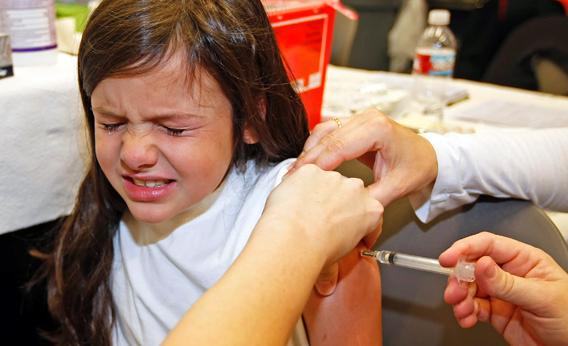Disclosure: In any review for a product or service, products or compensation may have been provided to me to help facilitate my review. All opinions are my own and honest. I am disclosing this in accordance with FTC Guidelines. Please see “Disclose” and "Terms of Use" tabs for more information.
It’s really not that surprising that even small children learn to fear shots and the needles used to deliver them. After all, you take them to a cold and sterile doctor’s office, set them on a tall table where they can’t get away, and allow doctors and nurses to poke and prod them. Of course, kids will never know how painful this experience is for you, how hard it is for you to watch them suffer and be virtually powerless to help. After all, vaccinations are an essential part of preserving your children’s health – you can’t skip them just because your kids are opposed. What you might not realize is that you actually have several options when it comes to reducing the trauma your kids undergo when they have to get shots. You can make the experience a lot easier on everyone involved and in the process, help your kids to overcome their fears. Here are just a few tips to get you started.
 The first thing you need to know is that you can be a big part of the cure. Whether you have infants, toddlers, or school-age children, your offspring look to you for comfort and support. Just having you near is often enough to calm and soothe them. So you should start by holding them on your lap when it’s time for a shot instead of handing them over to the doctor to be perched on an examining table. It might also be a good idea to breast or bottle feed small children while they’re getting a shot.
The first thing you need to know is that you can be a big part of the cure. Whether you have infants, toddlers, or school-age children, your offspring look to you for comfort and support. Just having you near is often enough to calm and soothe them. So you should start by holding them on your lap when it’s time for a shot instead of handing them over to the doctor to be perched on an examining table. It might also be a good idea to breast or bottle feed small children while they’re getting a shot.
Feeding is comforting and relaxing and although it won’t stop them from crying when they receive the actual injection, it can definitely help to keep them calm up until the shot and to settle down more quickly afterwards. Incredibly, studies have shown that the practice of adding sugar water to their regular bottle (sometimes called sweetease) can help to lessen the intensity and duration of reaction to a shot (in terms of crying, for example).
However, the main thing is to remain calm and relaxed yourself. Taking your kids for shots can definitely raise your level of tension, but when you ratchet up the anxiety, your kids will pick up on your cues and become nervous themselves, making the entire procedure even harder. Of course, there are also ways you can try to reduce the pain they feel when a shot is administered. For example, you might want to talk to your doctor about giving them acetaminophen about an hour before the shot. This is not right for all kids, but it could help to reduce the sting of a shot (and the subsequent achiness).
And there are also topical anesthetics to consider. Lidocaine-based creams like EMLA and LMX can be prescribed by your doctor beforehand and applied to the injection site ahead of time so as to greatly reduce the pain of a shot. This might be a good option for kids that are particularly sensitive or scared of shots. It’s not exactly advanced pain management, but it can definitely help. And since you don’t want your kids to fear the doctor or the shots they must receive, reducing anxiety and pain is a good place to start.
















vaccines are a touchy subject but i tend to enjoyy not worrying about tb and such so will continue to use them
We don’t vaccinate due to religious and medical reasons. You should look into it. There’s mercury in vaccines to preserve them; and tons of aluminum.
i think it is dangerous not to vaccinate, and can hurt others in the community such as the elderly and children under the age of 1 who are not able to be vaccinated. sure, there are possible dangers, just like everything else, but there is a reason kids in countries that vaccinate and have access to them live longer then kids in areas that don’t. they are a gift, and one i personally won’t take for granted, though i will not tell another how to live his or her life. every parent gets to make his or her own decisions for their family.